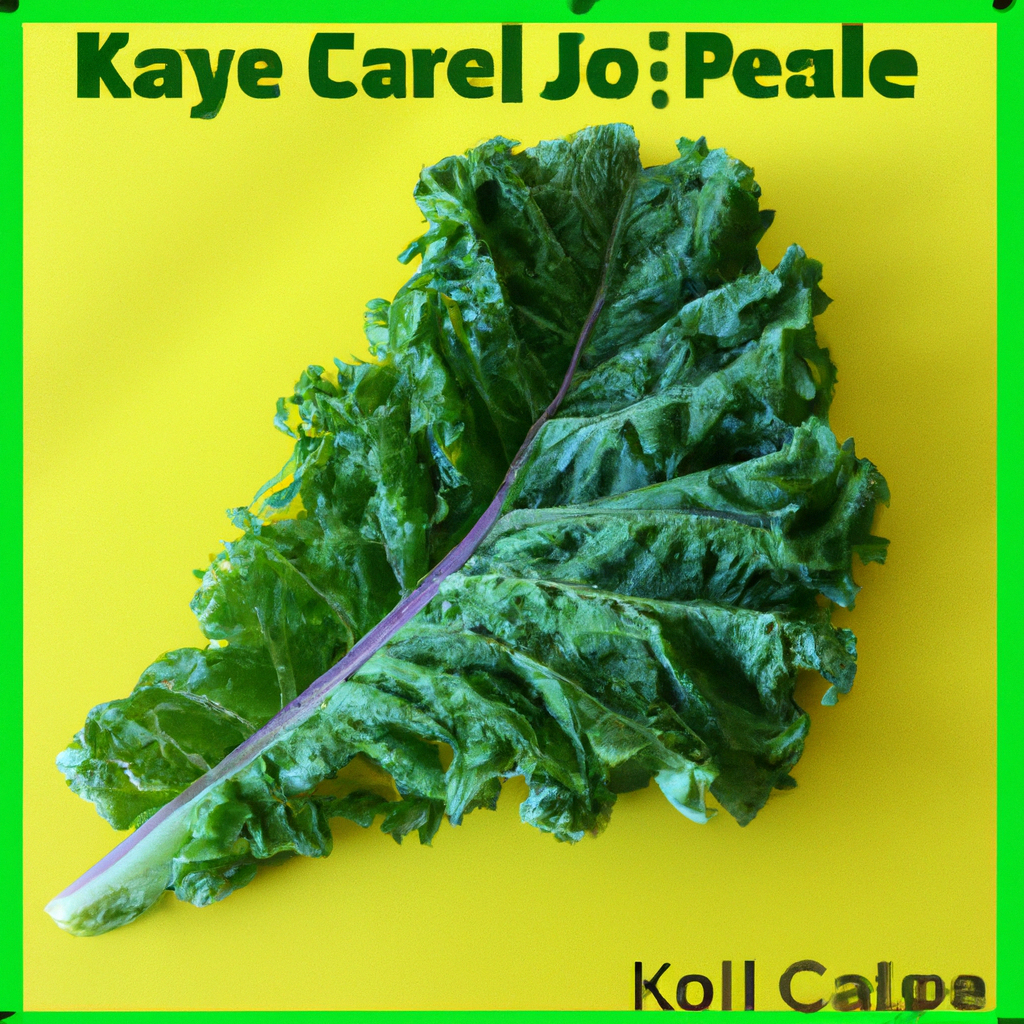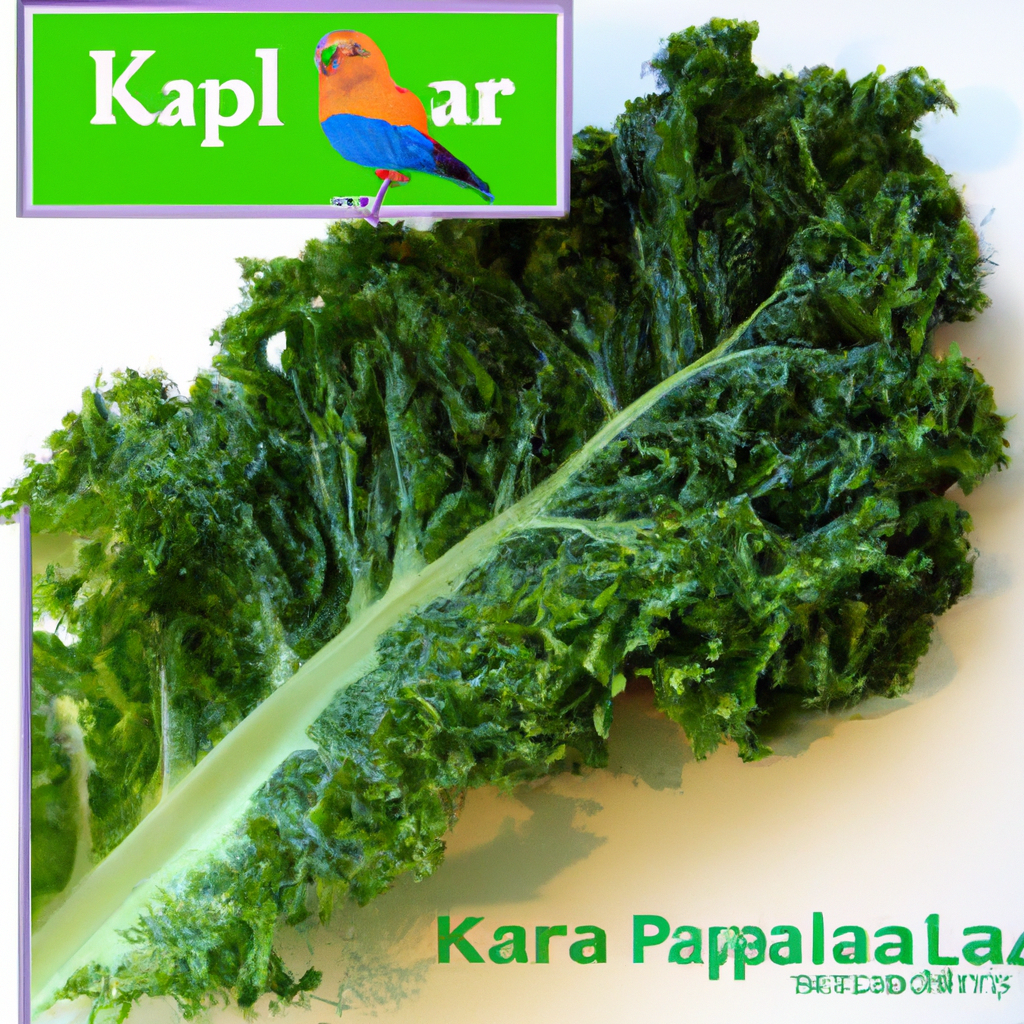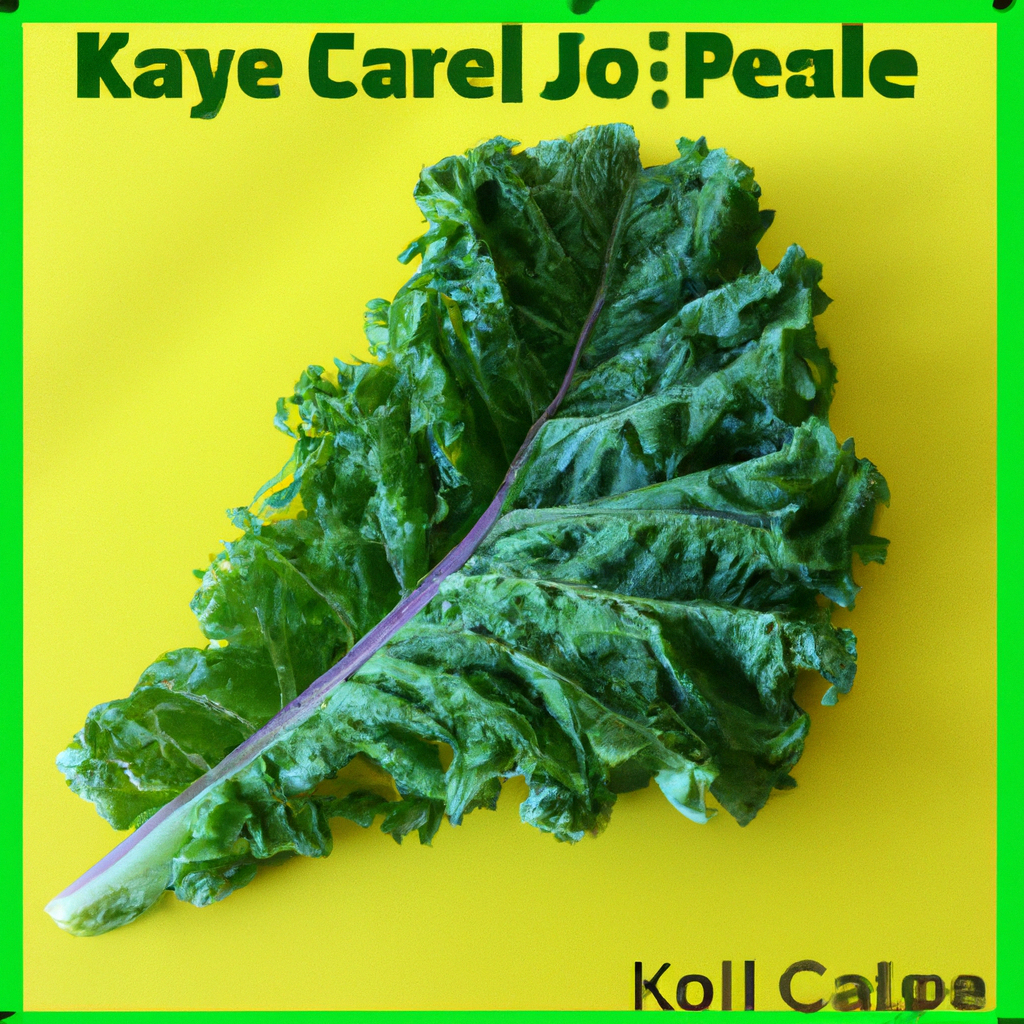Parrots are known for their diverse and voracious appetite, but when it comes to including kale in their diet, should you proceed with caution or embrace it wholeheartedly? The nutritional needs of these vibrant and intelligent birds are crucial for their overall health and well-being. In this article, we will explore the question “Can Parrots Eat Kale?” and examine the potential benefits and considerations of incorporating this leafy green vegetable into their meals. Discover how kale can complement your parrot’s diet and ensure a balanced and nutritious meal plan for your feathered friend.
Health benefits of kale for parrots
Kale is not only a popular vegetable among humans, but it can also provide numerous health benefits for parrots. Incorporating kale into your parrot’s diet can contribute to their overall well-being and promote a healthy lifestyle.
High in vitamins and minerals
One of the key health benefits of kale for parrots is its high content of vitamins and minerals. Kale is rich in vitamins A, C, and K, which are essential for maintaining good vision, immune function, and blood clotting. Additionally, kale contains minerals like calcium, potassium, and iron, which are necessary for proper bone health, muscle function, and oxygen transport in the body. By including kale in your parrot’s diet, you can ensure they receive a wide range of important nutrients.
Good source of antioxidants
Another notable health benefit of kale is its abundance of antioxidants. Antioxidants help protect cells from damage caused by harmful molecules called free radicals. Kale contains various antioxidant compounds such as beta-carotene, lutein, and zeaxanthin, which can support your parrot’s overall health and reduce the risk of chronic diseases.
Boosts immune system
Kale is known for its immune-boosting properties. Its high vitamin C content strengthens the immune system and helps ward off illnesses in parrots. A robust immune system is crucial for parrots to stay healthy and fight off infections. By including kale in their diet, you can enhance their immune response and improve their overall resilience.
Promotes healthy skin and feathers
Incorporating kale into your parrot’s diet can also have a positive impact on their skin and feathers. The vitamins and minerals present in kale are essential for maintaining healthy skin and a glossy feather coat. Kale’s nutrient profile supports the growth of strong feathers and helps prevent issues such as feather plucking and dry skin. By regularly feeding kale to your parrot, you can contribute to their external appearance and promote their overall beauty.
Nutritional value of kale
Understanding the nutritional value of kale is essential for identifying how it can benefit your parrot’s health. Let’s explore the key components that make kale a nutritious addition to your feathered friend’s diet.
Vitamins
Kale is a powerhouse of vitamins, including vitamin A, vitamin C, and vitamin K. Vitamin A is vital for maintaining good vision and supporting the immune system. Vitamin C is an antioxidant that boosts the immune system and aids in collagen production. Vitamin K is essential for blood clotting and bone health. By adding kale to your parrot’s diet, you can ensure their vitamin needs are met.
Minerals
Kale is a rich source of minerals such as calcium, potassium, and iron. Calcium is necessary for strong bones and eggshell formation in breeding parrots. Potassium is important for maintaining a healthy heart and proper muscle function. Iron is essential for oxygen transport in the body and preventing anemia. Including kale in your parrot’s diet can provide them with these essential minerals.
Fiber
Fiber is a crucial component of a healthy diet, and kale contains a significant amount of it. High fiber content can aid in digestion, regulate bowel movements, and promote a healthy gut environment. By incorporating kale into your parrot’s diet, you can support their digestive health and prevent issues such as constipation.
Protein
While kale is not a significant source of protein, it still contributes to your parrot’s overall protein intake. Protein is necessary for growth, repair, and maintenance of body tissues. By including kale in their diet, you can provide your parrot with additional protein alongside other protein-rich foods.
Water content
Kale has a high water content, which can contribute to your parrot’s overall hydration. Hydration is critical for normal bodily functions and maintaining healthy organ systems. By incorporating kale into your parrot’s diet, you contribute to their daily water intake and ensure they stay properly hydrated.
Caloric content
It’s important to consider the caloric content of kale when determining appropriate portion sizes for your parrot. While kale is a nutritious vegetable, it is relatively low in calories, which can be beneficial for weight management. Including kale in your parrot’s diet can provide them with essential nutrients without significantly impacting their calorie intake.
This image is property of images.unsplash.com.
Possible concerns with feeding kale to parrots
While kale can be a valuable addition to your parrot’s diet, there are some possible concerns to be aware of when feeding this leafy green vegetable to your feathered friend. It’s important to address these concerns to ensure your parrot’s health and well-being.
High oxalate content
Kale, like most leafy greens, contains a high oxalate content. Oxalates can bind to calcium in the body and form crystals, potentially leading to kidney or bladder stones. However, it is important to note that the oxalate content in kale is not exceptionally high compared to other vegetables, and it can still be included in moderate amounts as part of a varied diet. It is advisable to consult with a veterinarian to determine the appropriate amount of kale to feed your parrot.
Potential iodine interference
Kale is part of the cruciferous vegetable family, which contains compounds known as goitrogens. Goitrogens can interfere with the absorption of iodine, which is essential for thyroid function in parrots. However, when kale is fed in moderation and as part of a balanced diet, the potential negative impact on iodine absorption is minimal. It is important to monitor your parrot’s iodine levels and seek guidance from a veterinarian if necessary.
Gas and digestive issues
Some parrots may be more sensitive to certain vegetables, including kale, and may experience gas or digestive issues. If you notice that your parrot shows signs of discomfort such as bloating, excessive gas, or loose stools after consuming kale, it may be necessary to reduce or remove kale from their diet. Every parrot is unique, and individual sensitivities should be taken into account when introducing new foods.
Allergies and sensitivities
As with any new food, there is a possibility of allergies or sensitivities in some parrots. While it is relatively uncommon, it’s essential to monitor your parrot for any adverse reactions after introducing kale into their diet. Allergic reactions may include respiratory distress, swelling, or itchiness. If you observe any of these symptoms, discontinue feeding kale immediately and consult with an avian veterinarian.
Recommended ways to prepare kale for parrots
When including kale in your parrot’s diet, it’s important to prepare it in a way that maximizes nutritional quality and minimizes any potential harm. Follow these recommended preparation methods to ensure your parrot can safely enjoy kale.
Washing and removing pesticides
Before feeding kale to your parrot, it is crucial to wash it thoroughly to remove any traces of pesticides or chemicals. Organic kale is preferred, but if organic options are not available, rinse conventionally grown kale under running water for several minutes to reduce pesticide residue. It is essential to provide your parrot with the cleanest possible food for optimal health.
Chopping or shredding
Kale leaves can be quite tough, making it necessary to chop or shred them into smaller, more manageable pieces for your parrot. This will prevent choking hazards and make it easier for your parrot to consume. Ensure that the pieces are of an appropriate size for your parrot’s beak and feeding capabilities.
Blanching or cooking
While kale can be served raw, it is also beneficial to lightly cook or blanch it. Cooking or blanching kale can help break down some of the tough fibers and enhance its digestibility for your parrot. Steaming or gently boiling kale for a few minutes will help retain its nutritional value while making it easier for your parrot to digest. However, avoid overcooking kale as it may result in nutrient loss.
Mixing with other bird-friendly foods
To add variety and ensure a balanced diet, consider mixing kale with other bird-friendly vegetables, fruits, or pellets. This will provide your parrot with a diverse range of nutrients and flavors, making mealtime more enjoyable. Aim for a variety of colors and textures to stimulate your parrot’s interest and maintain a well-rounded diet.
This image is property of images.unsplash.com.
Moderation and variety in a parrot’s diet
When it comes to your parrot’s diet, moderation and variety are key components of ensuring optimal health. By following these guidelines, you can provide a well-balanced diet that includes kale alongside other nutritious foods.
Balancing kale with other vegetables
While kale offers numerous health benefits, it’s essential to balance it with a variety of other vegetables to ensure your parrot receives a wide range of nutrients. Including vegetables such as carrots, bell peppers, broccoli, and sweet potatoes can provide additional vitamins and minerals. Aim for a colorful variety of vegetables to ensure a well-rounded diet for your parrot.
Rotating food options
To prevent monotony and provide dietary variety, it’s advisable to rotate food options regularly. Parrots, like humans, benefit from a diverse diet that encompasses different flavors, textures, and nutrients. Introducing new foods and rotating their availability can help stimulate your parrot’s interest and provide a more enjoyable dining experience.
Monitoring portion sizes
While kale is a beneficial vegetable, it should be offered in moderation to avoid any potential negative effects. Portion sizes should be appropriate for your parrot’s size, age, and nutritional needs. Consult with a veterinarian to determine the optimal amount of kale to include in your parrot’s diet. Monitoring portion sizes can help prevent overfeeding and maintain a healthy weight.
Avoiding excessive feeding
Just like with any food, excessive feeding of kale can lead to imbalances in your parrot’s diet. While kale offers numerous health benefits, it should be part of a well-rounded diet that includes a variety of other foods. Avoid exclusively feeding kale to your parrot and ensure they have access to other essential nutrients from different food sources. Variety is crucial for a healthy and balanced diet.
Introduction of kale to a parrot’s diet
When introducing kale to your parrot’s diet, it’s important to proceed with caution and monitor their response to this new food. Follow these steps to ensure a smooth transition and assess any potential adverse reactions.
Gradual introduction
Introduce kale gradually to your parrot’s diet by including small amounts alongside their regular food. This will allow their digestive system to adjust and reduce the likelihood of any digestive upset. Gradually increasing the amount over a period of weeks will help your parrot become accustomed to kale without overwhelming their system.
Observing for any adverse reactions
Monitor your parrot closely for any adverse reactions after introducing kale. Pay attention to their behavior, droppings, and physical appearance. If you notice any signs of discomfort or abnormal changes, such as diarrhea, vomiting, or decreased appetite, discontinue feeding kale and consult with an avian veterinarian.
Seeking advice from avian veterinarians
When introducing any new food to your parrot’s diet, it’s always beneficial to seek advice from avian veterinarians. They can provide specific guidance based on your parrot’s individual needs, advise on appropriate portion sizes, and address any concerns or issues that may arise. Avian veterinarians are experts in the field and can help ensure your parrot’s dietary health.
Signs of a healthy diet in parrots
A well-balanced and nutritious diet will have visible positive effects on your parrot’s overall health. Pay attention to the following signs, indicating that their diet is meeting their nutritional needs.
Bright and alert behavior
Parrots with a healthy diet tend to exhibit bright and alert behavior. They are energetic and show interest in their surroundings. If your parrot appears active, engaged, and curious, it’s a positive sign that they are receiving the necessary nutrients from their diet, including kale.
Shiny feathers and vibrant colors
The condition of your parrot’s feathers is a good indicator of their nutritional status. A healthy diet, including kale, contributes to shiny feathers, vibrant colors, and overall feather quality. If your parrot’s feathers look dull, discolored, or lacklustre, it may be an indication of a nutrient deficiency or an imbalanced diet.
Regular droppings
Monitoring your parrot’s droppings is an essential aspect of assessing their dietary health. Healthy droppings should have a consistent color, consistency, and odor. If you notice any significant changes, such as diarrhea, a change in color, or an increase in frequency, it may be a sign that their diet needs adjustment.
Normal weight and body condition
A healthy diet will help your parrot maintain a normal weight and body condition. Regular weigh-ins and physical examinations can help ensure that your parrot is neither underweight nor overweight. Maintaining a healthy weight is crucial for overall well-being and can reduce the risk of various health issues.
Signs of potential issues in a parrot’s diet
It’s important to be aware of signs that may indicate potential issues with your parrot’s diet. By recognizing these signs, you can take appropriate action to ensure their nutritional needs are being met.
Lethargy or unusual behavior
If your parrot appears lethargic, lacks energy, or exhibits unusual behavior, it may be a sign of an inadequate diet. Nutritional deficiencies can impact cognitive function and energy levels. If you notice any significant changes in your parrot’s behavior, consult with an avian veterinarian to address any possible dietary issues.
Dull or discolored feathers
Dull or discolored feathers may be indicative of an inadequate diet or nutrient deficiencies. Feather quality can serve as a reflection of overall health and diet. If your parrot’s feathers lose their natural luster or show signs of discoloration, it may be necessary to reassess their diet and consult with an avian veterinarian.
Digestive problems
Digestive issues, such as diarrhea or constipation, are common signs of an imbalanced or unsuitable diet. If your parrot experiences frequent digestive problems or shows signs of discomfort, it may be necessary to adjust their diet by eliminating certain foods or introducing other alternatives. An avian veterinarian can provide guidance on how to address these issues.
Unexplained weight loss or gain
Significant, unexplained weight loss or gain can be indicative of an underlying issue with your parrot’s diet. While slight fluctuations in weight are normal, sudden and drastic changes should raise concerns. Weight management is crucial for the overall health of your parrot, so consult with an avian veterinarian to rectify any abnormal weight changes.

Consulting avian veterinarians
Seeking professional advice from avian veterinarians is crucial for maintaining your parrot’s optimal health and well-being. They are trained to address dietary concerns and provide guidance specific to your parrot’s individual needs.
Importance of professional advice
Avian veterinarians are experts in avian health and have specialized knowledge regarding the dietary requirements of parrots. Seeking their professional advice ensures that your parrot receives accurate and tailored guidance. They can assess your parrot’s overall health, recommend appropriate diets, and address any specific concerns or issues related to diet.
Getting regular check-ups
Regular check-ups with an avian veterinarian are essential for monitoring your parrot’s health and dietary needs. These visits allow the veterinarian to assess your parrot’s overall well-being and offer guidance on proper nutrition, including the role of kale in their diet. Routine check-ups can identify any potential issues early on and prevent them from developing into more serious health problems.
Discussing dietary concerns
Avian veterinarians are a valuable resource for discussing any dietary concerns you may have regarding your parrot. They can address specific questions, provide recommendations, and help you navigate any challenges or issues related to your parrot’s diet. By consulting an avian veterinarian, you can ensure that your parrot’s diet meets their specific nutritional requirements.
Conclusion
Considering the numerous health benefits and nutritional value of kale, it can be a valuable addition to your parrot’s diet. From its high vitamin and mineral content to its immune-boosting properties, kale offers a range of benefits that can support your parrot’s overall health and well-being. However, it’s important to introduce kale gradually, monitor their response, and consult with an avian veterinarian to ensure it aligns with their specific dietary needs. By incorporating kale as part of a balanced and varied diet, you can provide your parrot with the nutrients they need to thrive.



